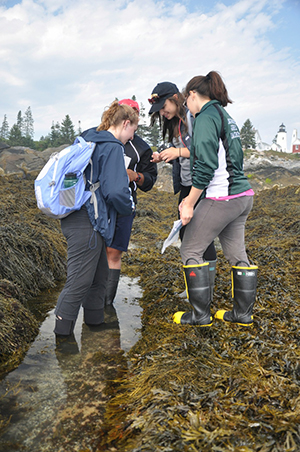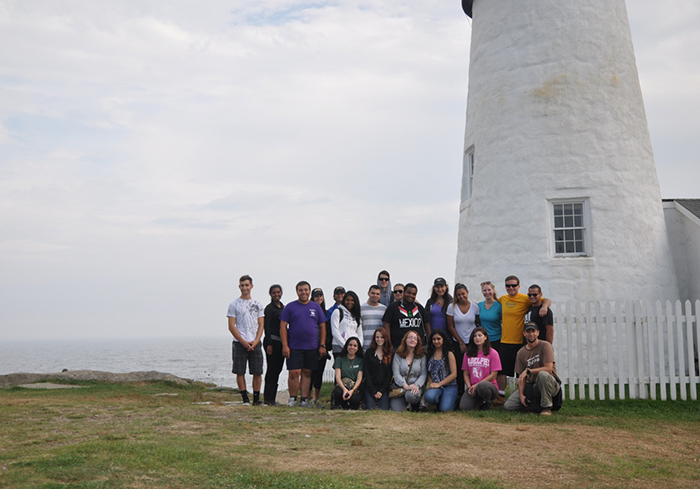Aaren Freeman, Ph.D., takes his marine biology students to Maine to study its coastal ecosystem.

Megan Ossman, Matt Bellomo, Lisa Marino and Alexandra Henaghan (left to right) conducting intertidal surveys at Pemaquid Point in Maine.
While a classroom setting equips students with plenty of fundamental skills, sometimes the best way to gain knowledge on a subject is to get out and explore it firsthand. This is exactly what Aaren Freeman, Ph.D., assistant professor of biology in the Adelphi University College of Arts and Sciences offered his students during a recent trip to a marine biology lab in Maine.
Dr. Freeman’s marine biology class, consisting mostly of biology majors, left on the first Friday afternoon in September 2014 for what Dr. Freeman described as a two-day “whirlwind tour” of Maine’s coastal ecosystem.
“Long Island has an abundance of soft sediment communities,” he explained, but Maine has many rocky shorelines, where different marine species thrive. This trip offered “an opportunity for students to explore a different type of habitat.”
Highlights of the trip included going out on a boat to do some plankton tows, observing and collecting samples from tide pools, and best of all, a whale watch to conclude the trip before returning to Long Island. On the whale watch, students had the opportunity to see humpback whales, fin whales and minke whales.
This trip was one of many offered by Adelphi that give students field experience and allow them to explore new places. Like the much-anticipated trip to Australia offered each spring break, the Maine excursion gave students a chance to think beyond the constraints of their own ecosystems.
“Part of the liberal arts education is that students experience new and interesting things outside of what they’ve previously known,” Dr. Freeman said. “I think that there’s a value to firsthand experiencing of these different communities, different habitats, different regions…to be aware of the causes and consequences of these diverse ecosystems.”
“This trip is only two days, but it’s not something students will forget about soon,” he said. “We get a lot of mileage out of this experience.”

Assistant Professor of Biology Aaren Freeman and his class in front of the light house at Pemaquid Point lighthouse, Maine.
For further information, please contact:
Todd Wilson
Strategic Communications Director
p – 516.237.8634
e – twilson@adelphi.edu